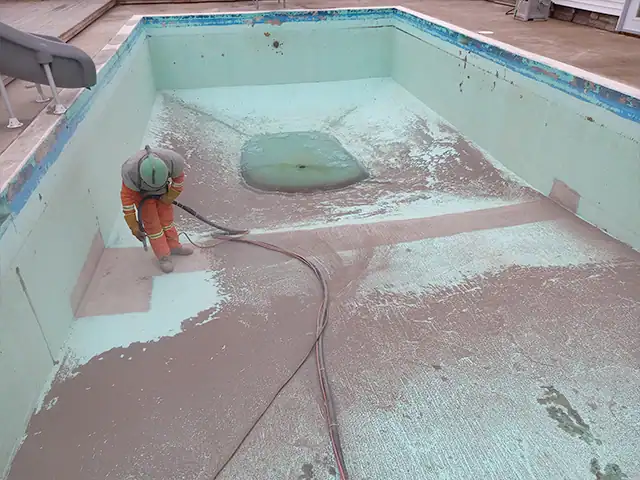Choosing between a fiberglass vs concrete pool might be the most consequential decision you’ll make in your backyard transformation journey. It’s not just about what looks best on installation day, but what will serve your family best—and cost you least—over the next decade and beyond.
The truth is, most pool buyers focus exclusively on upfront costs while overlooking the thousands of dollars in maintenance, repairs, and energy that will ultimately determine whether their investment was wise. Let’s dive into what really separates fiberglass and concrete pool types when you look at the complete ownership picture.

Contents
Pool Installation Consideration: Long-Term Cost Perspective
When comparing fiberglass vs concrete pool options, the true cost difference becomes apparent over a 15-year timespan. Fiberglass pools tend to cost less at the outset, while concrete pools may begin at a higher price point that can grow with extremely customized designs.
The long-term value equation shifts dramatically when you factor in maintenance, repairs, and energy costs. While concrete pools offer unlimited customization, they require significantly more upkeep.
Fiberglass pools can offer significant lifetime savings compared to concrete pools when you consider all cumulative costs. This savings comes primarily from reduced chemical usage, lower energy costs, and avoiding major resurfacing expenses.

Concrete Pool Resurfacing
Comparing Pool Installations and Upfront Costs
Fiberglass pools arrive as pre-manufactured shells that can be installed relatively quickly, whereas concrete pools require a longer, more extensive on-site construction process.
The installation process for fiberglass is more straightforward, allowing homeowners to potentially save thousands by coordinating parts of the project themselves. Concrete installations are more complex, usually requiring specialized contractors throughout the entire process.
- Site preparation: Both pool types require proper excavation, but concrete pools often need more extensive groundwork
- Labor requirements: Concrete pools demand specialized labor over a longer timeframe
- Timeline difference: Fiberglass pools can be swim-ready in weeks rather than months
Maintenance and Ongoing Expenses
Fiberglass pools feature a non-porous gel coat surface that resists algae growth and requires fewer chemicals. Concrete pools have porous surfaces that can harbor algae and bacteria, demanding more aggressive chemical treatment and brushing.
Fiberglass pool owners generally spend less on chemicals and maintenance each year compared to concrete pool owners, who often incur additional labor costs for more frequent cleaning.
When evaluating fiberglass vs concrete pool maintenance, consider these differences:
- Weekly maintenance: Fiberglass requires about 30 minutes weekly while concrete needs 2-4 hours.
- Chemical costs: Concrete pools use approximately 70% more chemicals annually.
- Professional cleaning: Concrete pools often need professional cleaning services 2-4 times per year. Meanwhile, fiberglass pools are easy to clean.
Surface Restoration Over Time
Fiberglass pools may need occasional touch-ups over time, while concrete pools generally require more extensive resurfacing and potential repairs during their lifespan.
This resurfacing difference represents one of the largest long-term cost disparities between the two pool types. A fiberglass pool might never need major restoration during the first 15 years of ownership.
Energy Efficiency and Potential Repairs
Fiberglass pools provide superior insulation properties that help maintain water temperature. Fiberglass’s insulating properties can help reduce heating expenses compared to concrete pools.
Concrete pools are more susceptible to structural issues like cracks and leaks, especially in regions with freeze-thaw cycles. Major repairs can be costly and may become more common over time as the pool ages.
The insulation advantage of fiberglass comes from:
- The natural thermal properties of the material
- The seamless one-piece construction that prevents heat loss
- The smooth surface that reduces pump energy requirements
Design Flexibility and Aesthetic Options
Concrete pools offer unlimited customization in shape, size, and features. If you’re dreaming of a completely unique design, concrete may be your only option.
Fiberglass pools come in pre-designed shapes and sizes, though modern manufacturers offer dozens of attractive models with built-in features like tanning ledges, bench seating, and varying depths.
When considering the fiberglass vs concrete pool aesthetic debate, remember that limitations in customization are balanced by:
- Modern fiberglass designs that include popular features
- Smooth, comfortable surfaces that are gentle on feet and swimsuits
- Consistent coloration that maintains its appearance longer
Durability and Resale Value
Fiberglass pools are highly flexible and can withstand ground movement better than concrete. They resist cracking and maintain their appearance with minimal care, often looking nearly new even after a decade.
Concrete pools, while extremely solid, are more rigid and susceptible to cracking with ground shifts. Their appearance can deteriorate without rigorous maintenance, potentially affecting home resale value.
In different climate conditions, the durability comparison shows:
- Cold climates: Fiberglass handles freeze-thaw cycles better due to flexibility
- Hot, sunny regions: Quality fiberglass gel coats resist UV damage and fading
- Areas with soil movement: Fiberglass adapts to minor ground shifts without cracking
Planning Your Next Step
Consider your budget not just for installation but for the entire 15-year ownership period. Factor in your timeline—if you want to be swimming this season, fiberglass offers a much quicker path to enjoyment.
Think about how much maintenance you’re willing to perform or pay for. The fiberglass vs concrete pool debate often comes down to this: do you want to spend your weekends maintaining your pool or enjoying it?
For most families, the long-term savings, reduced maintenance, and durability of fiberglass pools make them the smarter investment. The initial cost difference quickly disappears when you factor in the ongoing expenses of concrete.
Ready to explore a stress-free, cost-effective fiberglass pool? Request a quote from Pool Brokers USA.
